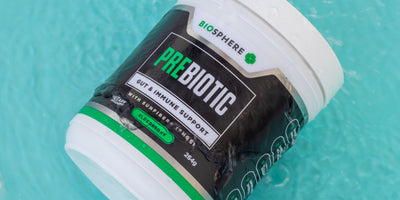
Prebiotic Promise in Easing Inflammatory Bowel Disease (IBD) Symptoms
Introduction to Inflammatory Bowel Disease (IBD): Understanding the Chronic Inflammatory Conditions Affecting the Digestive System and Their Current Treatment Paradigms
Inflammatory Bowel Disease (IBD) includes conditions like Crohn's Disease and Ulcerative Colitis, which involve chronic inflammation of the digestive tract. Symptoms such as diarrhoea, abdominal pain, and weight loss can seriously affect one's quality of life, making it a high-priority health issue for many people.
Existing treatment strategies primarily consist of anti-inflammatory medications, immune system suppressors, and sometimes surgical intervention. However, these treatments have their limitations, including the risk of severe side effects and the tendency for symptoms to recur over time. This underscores the need for alternative approaches to treating IBD, with prebiotics emerging as a promising area for research.
Given the limitations of current treatments, there's a growing interest in the role of the gut microbiome in IBD. This has led to investigations into alternative and supplementary treatments, such as probiotics and prebiotics, which could offer fewer side effects and potentially more durable relief from symptoms.
The Role of the Gut Microbiome in IBD: Delving Into the Importance of Bacterial Balance for Digestive Health and Its Implications for Treatment
The gut is home to trillions of bacteria and other microorganisms that aid in digestion, nutrient absorption, and immune system regulation. In individuals with IBD, however, the gut microbiome is often imbalanced, a condition known as dysbiosis. This microbial imbalance can contribute to ongoing inflammation, perpetuating the cycle of flare-ups and symptom recurrence.
Research in the field has shown that people with IBD often have a less diverse gut microbiome compared to those without the condition. This lack of diversity, combined with a proliferation of potentially harmful bacteria, presents an intriguing angle for treatment — could rebalancing the gut microbiome alleviate IBD symptoms?
The idea isn't as far-fetched as it may seem. Some bacterial species produce metabolites that have anti-inflammatory properties. Therefore, strategies that promote a balanced microbiome could hold promise for future treatments. This has led researchers to explore the potential benefits of prebiotics, which specifically nourish beneficial bacteria.
Exploring Prebiotics as Gut Soothers: Understanding Non-Digestible Food Components and Their Role in Nurturing Beneficial Bacteria

Prebiotics are non-digestible food components that beneficial gut bacteria feed on. Unlike probiotics, which are live bacteria consumed to add to the gut's microbial community, prebiotics are more like "fertilisers" for existing beneficial bacteria. Examples include inulin, fructo-oligosaccharides (FOS), and galacto-oligosaccharides (GOS).
The main goal of prebiotics is to foster a balanced gut microbiome. By doing so, they could potentially alleviate the symptoms of IBD. Beneficial bacteria in the gut produce metabolites like short-chain fatty acids (SCFAs), which have anti-inflammatory properties. These properties make prebiotics a subject of intense scientific investigation as a potential treatment for IBD.
However, the gut microbiome is a complex and dynamic ecosystem, and we're still learning how it interacts with various health conditions, including IBD. Therefore, while the use of prebiotics is promising, it's crucial to continue researching their efficacy, optimal dosages, and possible side effects.
Nourishing the Beneficial Bacteria: The Science Behind How Prebiotics Serve as Fuel for Beneficial Microorganisms and the Challenges Involved
Prebiotics primarily work by nourishing beneficial bacteria, such as Bifidobacteria and Lactobacilli. These bacteria ferment prebiotic fibres to produce SCFAs like butyrate, which in turn nourish the cells of the gut lining and exert anti-inflammatory effects.
However, one of the challenges in using prebiotics as a treatment for IBD is the complexity of the gut microbiome. There's still much we don't know about how adding prebiotics to the diet will affect the overall microbial balance. For example, will prebiotics only nourish beneficial bacteria, or could they also feed harmful bacteria, potentially exacerbating symptoms?
The gut microbiome is also highly individualistic, influenced by a host of factors including diet, lifestyle, and genetics. This adds another layer of complexity in predicting how different people will respond to prebiotic supplementation, making personalised treatment plans essential.
Strategies for Reducing Inflammation: How Prebiotics Can Play a Role in Alleviating Symptoms of IBD and the Precautions to Take
The ultimate aim of using prebiotics in IBD management is to reduce inflammation, thereby alleviating symptoms. SCFAs like butyrate, which are produced when beneficial bacteria ferment prebiotics, have been shown to inhibit the production of pro-inflammatory cytokines while boosting anti-inflammatory compounds.
It's crucial to remember, however, that while the science behind prebiotics is promising, they shouldn't be considered a substitute for existing medications or treatments. It's essential to consult healthcare providers before incorporating prebiotics into your treatment plan to ensure that they're appropriate for your specific condition and won't interact negatively with other medications you may be taking.
Given that the research around prebiotics and IBD is still in its infancy, more clinical trials are needed to fully understand the potential benefits and risks. As always, a cautious and personalised approach is advised.
Insights from Clinical Trials and Prebiotics: Evaluating the Current State of Research, its Limitations, and the Future of Prebiotic Treatments for IBD
Several clinical trials have explored the efficacy of prebiotics in treating IBD, but the research is still relatively nascent. While some studies have shown positive results, such as increased microbial diversity and reduced inflammation markers, these often involve small sample sizes and are of short duration.
Moreover, the gut microbiome varies significantly between individuals. This individual variability makes it challenging to generalise the findings of existing studies to a broader population. Therefore, larger and more long-term clinical trials are needed to provide more definitive answers.
Despite these limitations, the research thus far is encouraging and suggests that prebiotics could play a role in future IBD treatment protocols. More extensive studies could offer insights into the optimal types and dosages of prebiotics for different forms of IBD, potentially leading to more targeted and effective treatments.
A Hopeful Approach with Future Potential for Treating Inflammatory Bowel Disease through Gut Microbiome Modulation
Prebiotics offer a promising yet still largely unproven approach for managing IBD symptoms. By nourishing beneficial bacteria, they may help restore balance to the gut microbiome, which could in turn reduce inflammation and alleviate symptoms. However, given that the research is still in its early stages, it's crucial to approach prebiotic treatments cautiously.
If you're considering using prebiotics to manage IBD, consult your healthcare provider for a treatment plan tailored to your specific needs. As our understanding of the gut microbiome continues to deepen, prebiotics may emerge as a vital part of a multi-faceted treatment strategy for IBD. The key will be integrating this approach with traditional treatments to offer patients the best chance at long-term symptom relief.
It's also essential to consider the long-term effects of prebiotic treatments, which remain largely unknown. As future research works to address these gaps in our understanding, the role of prebiotics in IBD management could become clearer, either validating their efficacy or revealing their limitations.
In conclusion, while we await more comprehensive and longer-term studies, prebiotics represent a hopeful and potentially impactful avenue for IBD treatment. They offer the possibility of a more natural, less invasive way to manage a complex and often debilitating condition. By focusing on the root causes of IBD, rather than just treating its symptoms, prebiotics could significantly improve the quality of life for many patients. However, as always, it's crucial to consult healthcare professionals for a treatment plan tailored to your unique health needs.
Summary
Introduction to IBD and Its Current Treatments- IBD, including Crohn's Disease and Ulcerative Colitis, causes chronic digestive tract inflammation.
- Existing treatments like anti-inflammatory medications and surgery have limitations, prompting prebiotic research.
- IBD patients often experience gut microbiome imbalance (dysbiosis), leading to inflammation.
- Treatments targeting microbial diversity and harmful bacteria are being explored to alleviate IBD symptoms.
- Prebiotics, such as inulin, nourish beneficial gut bacteria, unlike probiotics which add new bacteria.
- They aim to balance the gut microbiome and are a research focus, though their full impact is still under study.
- Prebiotics feed beneficial bacteria like Bifidobacteria, which produce anti-inflammatory SCFAs.
- The gut microbiome's complexity and individuality require personalised treatment approaches and further study.
- Prebiotics aim to reduce inflammation and alleviate IBD symptoms but aren't standalone treatments.
- Healthcare provider consultation is essential before adding prebiotics to treatment plans, and more research is needed.
- Some clinical trials show promising prebiotic effects but are limited by size and duration.
- Gut microbiome variability requires larger, long-term trials for more definitive conclusions.
- Prebiotics offer a promising but experimental approach to managing IBD.
- Healthcare consultation, personalised plans, and integrating prebiotics with traditional treatments could enhance IBD management.
- Prebiotics provide a hopeful, potentially impactful, and natural IBD treatment avenue.
- While promising, prebiotics must be considered and used in consultation with healthcare professionals for tailored treatment plans.
Prebiotic Information
For everything you need to know about prebiotics and prebiotic supplements, check out our comprehensive information page here.
Prebiotic
Biosphere Nutrition’s Prebiotic Powder is a unique blend of Sunfiber® and Black Elderberry Extract, designed to nurture gut health and support the immune system. This easy-to-mix, great-tasting formula ensures optimal absorption and digestive comfort. To learn more about our Prebiotic, check out the product page here.









